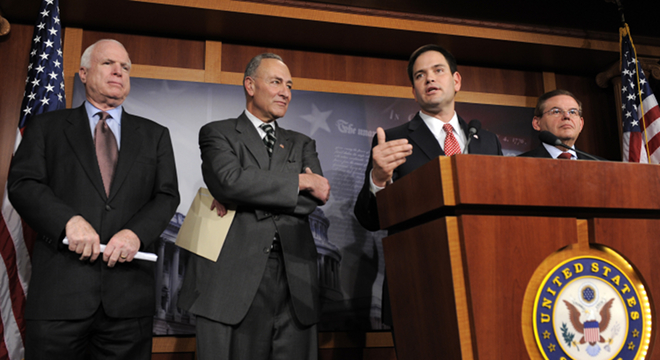Any immigration reform bill that comes out of Congress this year is expected to expand the number of visas available for future immigrants. But religious leaders, labor groups, and immigration activists are worried that the new visas will come at the expense of families, who could find it harder to sponsor their relatives to join them in the United States.
“Some are trying to pit economic interests against family,” AFL-CIO President Richard Trumka told reporters in a press call on Wednesday. “They say that ‘on merit’ brothers and sisters and children and spouses are worth less than people employers prefer. The labor movement doesn’t buy that for one second. The idea that family unity stands in opposition to economic growth is completely backwards. Strong families are critical to our economic growth.”
Catholic and evangelical leaders backing immigration reform have made family unity a priority and Trumka was joined by several clergy members.
“Family-based immigration has kept our social fabric strong and helped build this nation,” Kevin Appleby, director of migration policy at the U.S. Conference of Catholic Bishops, said on the call. “It would ignore our history to forsake it.”
Lawmakers working on a bipartisan reform bill have suggested reorienting America’s immigration system away from family visas, which make up about 65 percent of new permanent residents each year, and more towards high-skilled workers who could help boost the economy.
“Right now you get green cards to adult children, to grandparents,” Sen. Lindsey Graham (R-SC), one of the leaders of the “Gang of 8” working on a comprehensive bill, told the Washington Post last month. “What I want to do is reserve green cards based on the economic needs of the country, and we’ll do something for families. But the goal for me is to replace a chained migration immigration system with an economic-based immigration system.”
Sen. Marco Rubio (R-FL) has also expressed concern about the ratio of work to family visas, although he has suggested that the solution might be to simply increase the number of high-skilled visas and not necessarily reduce the family categories.
“I’m a big believer in family-based immigration,” he told the Wall Street Journal in January. “But I don’t think that in the 21st century we can continue to have an immigration system where only 6.5% of people who come here, come here based on labor and skill. We have to move toward merit and skill-based immigration.”
Graham and his colleagues have yet to release their draft legislation, but there are proposals floating around for how a revised system might look. Former Florida governor Jeb Bush, for example, argued in his recent book on immigration policy that US residents should no longer be able to sponsor siblings, parents, or adult children for green cards. To encourage more high-skilled workers to stay in the country, he suggested the system might be streamlined for bringing in spouses and young children instead.









